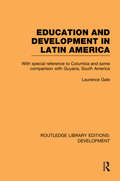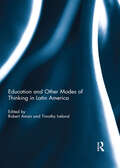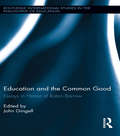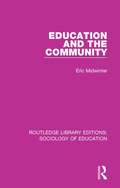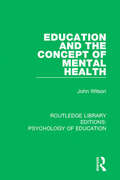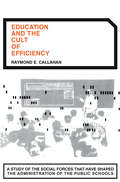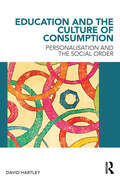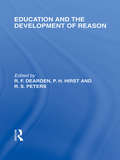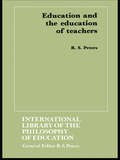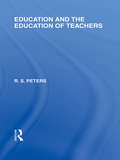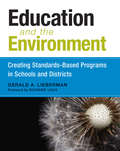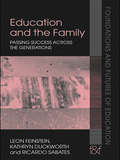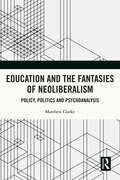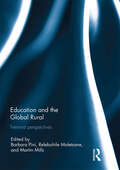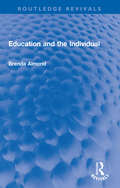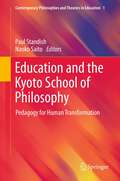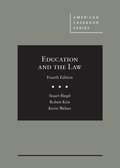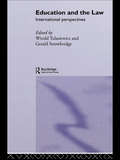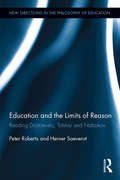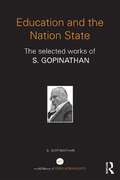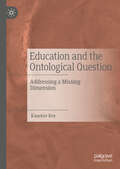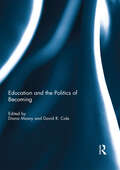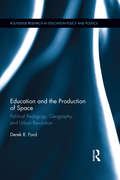- Table View
- List View
Education and development in Latin America (Routledge Library Editions: Development)
by Laurence GaleFirst published in 1969, this volume presents a survey of the contemporary national education system in Latin American countries. Laurence Gale describes the uneven provision of schools for different sections of the community and the problems which arise with the racial, cultural and geographical difficulties. He examines the main features in education throughout Latin America, areas of co-operation and agreement and differences of policy and provision.
Education and other modes of thinking in Latin America
by Robert Aman and Timothy IrelandAfter long periods of military dictatorships, civil wars, and economic instability, Latin America has changed face, and become the foremost region for counter-hegemonic processes. This book seeks to address contemporary paradigms of education and learning in Latin America. Although the production of knowledge in the region has long been subject to imperial designs and disseminated through educational systems, recent interventions – from liberation theology, popular education, and critical literacy to postcolonial critique and decolonial options – have sought to shift the geography of reason. Over the last decades, several Latin American communities have countered this movement by forming some of the most dynamic and organised forms of resistance: from the landless movements in Brazil to the Zapatistas in the Chiapas region of Mexico, from the indigenous social movements in Bolivia to Venezuela’s Chavistas, to mention but a few. The central question to be addressed is how, in times of historical ruptures, political reconstructions, and epistemic formations, the production of paradigms rooted in ‘other’ logics, cosmologies, and realities may renegotiate and redefine concepts of education, learning, and knowledge. Consequently, this book transcends disciplinary, epistemological, and methodological boundaries in education and learning by engagement with ‘other’ paradigms. This book was originally published as a special issue of the International Journal of Lifelong Education.
Education and the Commercial Mindset
by Samuel E. AbramsThe movement to privatize K-12 education is stronger than ever. Samuel Abrams examines the rise of market forces in public education and reveals how a commercial mindset that sidesteps fundamental challenges has taken over. Nevertheless, public schools should adopt lessons from the business world, such as raising teacher salaries to attract talent.
Education and the Common Good: Essays in Honor of Robin Barrow (Routledge International Studies in the Philosophy of Education #31)
by John GingellRobin Barrow has been one of the leading philosophers of education for more than forty years. This book is a critical but appreciative examination of his work by some of the leading philosophers of education at work today, with responses from Professor Barrow. It will focus on his work on curriculum, the analytic tradition in philosophy, education and schooling, and his use of Greek philosophy to enrich current debates in the subject. This work will be of interest to all those who have been influenced by his contributions to educational and philosophical debate.
Education and the Community (Routledge Library Editions: Sociology of Education #37)
by Eric MidwinterFirst published in 1975, this book is the first to set out a blueprint for how schools can move from a ‘traditional’ to a ‘community’ base at local authority level. After presenting a historical analysis of the organisational development of the local education authority, it goes on to put forward a detailed proposal for an across-the-board, radically reformed education service at pre-school, school, post-school and college levels. Finally, it locates such a reformed ‘community education’ system in the context of community development at large.
Education and the Concept of Mental Health (Routledge Library Editions: Psychology of Education)
by John WilsonThe concept of ‘normality’ or mental health is a difficult one to define, but educators and social psychologists must have a clear definition of it in order to proceed with practical work. In this stimulating and informative book, originally published in 1968, Mr Wilson discusses the idea of mental health, both as a general concept and specifically as it affects the teacher as educator. He deals with the problems of learning and the ‘difficult’ child, not confining his suggestions within the boundaries of curricular teaching but exploring the wider aspect of moral education.
Education and the Cult of Efficiency: A Study of the Social Forces That Have Shaped the Adminstration of the Public Schools
by Raymond E. CallahanRaymond Callahan's lively study exposes the alarming lengths to which school administrators went, particularly in the period from 1910 to 1930, in sacrificing educational goals to the demands of business procedures. He suggests that even today the question still asked is: "How can we operate our schools?" Society has not yet learned to ask: "How can we provide an excellent education for our children?"
Education and the Culture of Consumption: Personalisation and the Social Order
by David HartleyFor nearly 200 years the organisational form of the school has changed little. Bureaucracy has been its enduring form. The school has prepared the worker for the factory of mass production. It has created the 'mass consumer' to be content with accepting what is on offer, not what is wanted. However, a ‘revised’ educational code appears to be emerging. This code centres upon the concept of ‘personalisation’, which operates at two levels: first, as a new mode of public service delivery; and second, as a new ‘grammar’ for the school, with new flexibilities of structure and pedagogical process. Personalisation has its intellectual roots in marketing theory, not in educational theory and is the facilitator of 'education for consumption'. It allows for the 'market' to suffuse even more the fabric of education, albeit under the democratic-sounding call of freedom of choice. Education and the Culture of Consumption raises many questions about personalisation which policy-makers seem prone to avoid: Why, now, are we concerned about personalisation? What are its theoretical foundations? What are its pedagogical, curricular and organisational consequences? What are the consequences for social justification of personalisation? Does personalisation diminish the socialising function of the school, or does it simply mean that the only thing we share is that we have the right to personalised service? All this leads the author to consider an important question for education: does personalisation mark a new regulatory code for education, one which corresponds with both the new work-order of production and with the makeover-prone tendencies of consumers? The book will be of great interest to postgraduate students and academics studying in the fields of education policy and the social foundations of education, and will also be relevant to students studying public policy, especially health care and social care, and public management.
Education and the Development of Reason (International Library of the Philosophy of Education Volume 8)
by R. F. DeardenThis volume critically and constructively discusses philosophical questions which have particular bearing on the formulation of educational aims. The book is divided into three major parts: the first deals with the nature of education, and discusses the various general aims, such as 'mental health', 'socialization' and 'creativity' which have been thought to characterize it; the second section is concerned with the nature of reason and its relationship to feeling, will and action; finally the development of different aspects of reason in an educational context is considered.
Education and the Education of Teachers (International Library Of Philosophy Of Education Ser.)
by R. S. PetersFirst Published in 1977. Routledge is an imprint of Taylor & Francis, an informa company.
Education and the Education of Teachers (International Library of the Philosophy of Education volume 18)
by R.S. PetersThis collection of important and significant papers examines a wide range of issues. One of the author's main concerns is to clarify the meaning of 'education' and 'quality in education' - a phrase often used in public debate but seldom scrutinized. Long-standing ambiguities latent in the concept of 'liberal education' are also exposed, and Herbert Spencer's question 'What knowledge is of most worth?', vital in the light of the recent vast development of knowledge, is considered. The first section of the collection clarifies different aspects of the concept of education and to reflect upon the difficulties and dilemmas facing teachers who strive to educate their pupils as distinct from just preparing them for examinations. This section concludes with a constructive re-examination of Plato's conception of education with a view to seeing what is acceptable in it instead of just concentrating on what is manifestly unacceptable. The second section is concerned with the role of edcuational theory in the education of teachers.
Education and the Environment: Creating Standards-Based Programs in Schools and Districts
by Richard Louv Gerald A. Lieberman"For decades, Gerald Lieberman has been at the forefront of environment-based learning. The concept, which has acquired several names over the years, is essentially this: children and young people learn best when their time in the classroom is augmented by experiences in the wider community . . . . School should be more than a polite form of incarceration; it should be a portal to a wider world. Gerald Lieberman's ongoing work underscores the right of a whole child to feel and be fully alive."--From the foreword by Richard Louv, author of Last Child in the Woods"Jerry has been a true pioneer for decades, breaking the trail for the rest of us. What makes his work so impressive is that he not only conceives and writes about new K-12 education models, he finds effective ways to actually implement them on a significant scale. This book recounts some of those great adventures, and provides an indispensable map for any teacher or administrator who seeks new ideas for how to prepare students for the challenges of the twenty-first century."--James L. Elder, director, Campaign for Environmental LiteracyIn this unique book, curriculum expert Gerald A. Lieberman provides an innovative guide to creating and implementing a new type of environmental education that combines standards-based lessons on English language arts, math, history, and science with community investigations and service learning projects. By connecting academic content with local investigations, environmental study becomes not simply another thing added to the classroom schedule but an engaging, thought-provoking context for learning multiple subjects. The projects outlined further students' understanding of the way humanand natural "systems" interact locally and globally, and provide the next generation with the knowledge necessary for making decisions that will be critical to their future--and ours.
Education and the Environment: Creating Standards-Based Programs in Schools and Districts
by Gerald A. LiebermanIn this timely book, curriculum expert Gerald A. Lieberman provides an innovative guide to creating and implementing a new type of environmental education that combines standards-based lessons on English language arts, math, history, and science with community investigations and service learning projects. By connecting academic content with local investigations, environmental study becomes not simply another thing added to the classroom schedule but an engaging, thought-provoking context for learning multiple subjects. The projects outlined in the book further students&’ understanding of the way human and natural &“systems&” interact locally and globally, and provide the next generation with the knowledge necessary for making decisions that will be critical to their future—and ours.
Education and the Family: Passing Success Across the Generations (Foundations and Futures of Education)
by Leon Feinstein Kathryn Duckworth Ricardo SabatesWhy it is that success, deprivation or disadvantage are so often passed down intergenerationally? What part does education play? The educational achievement of parents is often reflected in that of their children and there are many underlying causes for such a relationship. Education and the Family argues that government policy has an important role to play in addressing this inequality even though many of the causes lie within the home. Although each child should be supported to achieve his or her objectives, differences in the willingness or capabilities of families to take advantage of educational opportunities exacerbate social class differences and limit actual equality of opportunity for many. Understanding the causes of this transmission is key to tackling both social class inequality and to expanding the skill base of the economy. By providing an overview of academic and policy thinking in relation to the role of the family, this book explores the educational success of children. It focuses on the education of the parents but also considers how the family - compared to wider, external influences such as schools - is a driver of differences in educational outcomes. It concludes with a consideration of what policy-makers are attempting to do about this key issue and why, and how this will impact on schools and teachers. This book will interest researchers and academics in education and social policy, as well as teachers and other education and social policy practitioners.
Education and the Fantasies of Neoliberalism: Policy, Politics and Psychoanalysis
by Matthew ClarkeEducation and the Fantasies of Neoliberalism revitalizes conversations about the nature and purpose of education in a global context characterized by concerns about quality and equity in education, reflecting wider economic and political anxieties around declining productivity and social inclusion. The book illustrates how Lacanian psychoanalytic theory offers a conceptual vocabulary for exposing and critiquing the fantasmatic nature of policy and practice, while foregrounding the tensions and contradictions they seek to conceal. Specifically, the book draws on ideas of lack, fantasy and desire from Lacanian psychoanalytic theory to gain insights into the contentious but disavowed politics of reform in education. The book builds on cutting-edge work in political and psychoanalytic theory to offer unique insights that challenge and contest the simplistic and often trivializing readings of education in contemporary media and political debates. Offering a novel perspective on education policy reform, this book will be of great interest to academics, researchers and post-graduate students in the fields of philosophy of education and educational policy and politics.
Education and the Global Rural: Feminist Perspectives
by Barbara Pini, Relebohile Moletsane, and Martin MillsThis edited collection challenges the urban-centric nature of much feminist work on gender and education. The context for the book is the radical reconfiguration of rural areas that has occurred in recent decades as a result of globalisation. From a range of diverse national contexts, including Kenya and South Africa, Australia and Canada, and the United States and Pakistan, authors explore the intersections between masculinity, femininity, and rurality in education. In recognition of the heterogeneity of categories such as ‘rural girl’ and ‘rural boy’ they attend to how educational exclusions can be magnified by differences in relation to social locations such as class, race, or sexuality. Similar critical insights are brought to bear as authors examine what it means to be a male or female teacher in rural environments. Contributors draw on data ranging from contemporary feature films to historical materials, along with detailed ethnographic work and participatory approaches, to produce a compelling narrative of the need to understand education as experienced by those who are not part of the urban majority. This book was originally published as a special issue of Gender and Education.
Education and the Individual (Routledge Revivals)
by Brenda AlmondFirst published in 1981, Education and the Individual presents a reasoned case for maintaining the maximum freedom of choice in education in those areas where the interests of the individual and the state conflict. The book argues that ultimately the freedom to opt out of the education system altogether must be protected, as well as the freedom to choose a religious education in a secular state, or a secular education in a religious state, and freedom from political indoctrination. It analyses what is required of education in a liberal society, and explores its implications for the wider international context of human rights. It also promotes the basic rights of freedom of choice in education and, wherever conflict is inevitable, it argues for the issue to be settled in favour of the individual, rather than the state. Education and the Individual will appeal to those with an interest in the history of education, the philosophy of education, and the relationship between education and politics.
Education and the Kyoto School of Philosophy
by Naoko Saito Paul StandishThe work of the Kyoto School represents one of the few streams of philosophy that originate in Japan. Following the cultural renaissance of the Meiji Restoration after Japan's period of closure to the outside world (1600-1868), this distinctly Japanese thought found expression especially in the work of Kitaro Nishida, Keiji Nishitani and Hajime Tanabe. Above all this is a philosophy of experience, of human becoming, and of transformation. In pursuit of these themes it brings an inheritance of Western philosophy that encompasses William James, Hume, Kant and Husserl, as well as the psychology of Wilhelm Wundt, into conjunction with Eastern thought and practice. Yet the legacy and continuing reception of the Kyoto School have not been easy, in part because of the coincidence of its prominence with the rise of Japanese fascism. In light of this, then, the School's ongoing relationship to the thought of Heidegger has an added salience. And yet this remains a rich philosophical line of thought with remarkable salience for educational practice. The present collection focuses on the Kyoto School in three unique ways. First, it concentrates on the School's distinctive account of human becoming. Second, it examines the way that, in the work of its principal exponents, diverse traditions of thought in philosophy and education are encountered and fused. Third, and with a broader canvas, it considers why the rich implications of the Kyoto School for for philosophy and education have not been more widely appreciated, and it seeks to remedy this. The first part of the book introduces the historical and philosophical background of the Kyoto School, illustrating its importance especially for aesthetic education, while the second part looks beyond this to explore the convergence of relevant streams of philosophy, East and West, ranging from the Noh play and Buddhist practices to American transcendentalism and post-structuralism.
Education and the Law (American Casebook)
by Stuart Biegel Robert Kim Kevin WelnerContaining over 20% new content and two additional chapters, this updated casebook addresses legal and public policy issues and controversies affecting K-12 as well as higher education. In addition to fundamental caselaw, the book includes fifty-nine original hypotheticals, extensive material on technology-related issues, recent developments in First Amendment law, “guidance” from the Office for Civil Rights of the U.S. Department of Education, and a strong focus on equal access to quality education. Topical coverage includes campus safety and the criminal justice system, the rights of educators, bilingual education, disability rights law, race-conscious remedies, religion in the schools, LGBT-related controversies, gender equity, and expanded coverage of privacy law issues, the school-to-prison pipeline, cyber-bullying, the impact of “Race to the Top” and ESEA flexibility, the ongoing battle over K-12 teacher tenure rights, and the implications of the burgeoning charter school movement.
Education and the Law: International Perspectives
by Witold Tulasiewicz Gerald StowbridgeThis edited collection addresses a subject which is topical not only in Britain, where there has been a spate of laws and regulations affecting the structure and content of education, but also in developed and developing countries, where the overriding motivation in many cases has been to raise economic performance. The first part of the book deals with the way legislation affects education and training both directly and tangentially, and how the law through its influence on such things as participation rates, certification and employer involvement can affect the level and degree of economic activity. Contributors examine the education systems of the USA, Kenya, Japan, Germany, Nigeria, Britain and France to illustrate the interdependence of the elements involved. The second part focuses on the concept of curriculum control. Chapters take a comparative approach to what is taught in the classroom and how the implementation of legislation affects all aspects of a country's education system.
Education and the Limits of Reason: Reading Dostoevsky, Tolstoy and Nabokov (New Directions in the Philosophy of Education)
by Peter Roberts Herner SaeverotIn recent decades, a growing body of educational scholarship has called into question deeply embedded assumptions about the nature, value and consequences of reason. Education and the Limits of Reason extends this critical conversation, arguing that in seeking to investigate the meaning and significance of reason in human lives, sources other than non-fiction educational or philosophical texts can be helpful. Drawing on the work of Dostoevsky, Tolstoy and Nabokov, the authors demonstrate that literature can allow us to see how reason is understood and expressed, contested and compromised – by distinctive individuals, under particular circumstances, in complex and varied relations with others. Novels, plays and short stories can take us into the workings of a rational or irrational mind and show how the inner world of cognitive activity is shaped by external events. Perhaps most importantly, literature can prompt us to ask searching questions of ourselves; it can unsettle and disturb, and in so doing can make an important contribution to our educational formation. An original and thought provoking work, Education and the Limits of Reason offers a fresh perspective on classic texts by Dostoevsky, Tolstoy and Nabokov, and encourages readers to reconsider conventional views of teaching and learning. This book will appeal to a wide range of academics, researchers and postgraduate students in the fields of education, literature and philosophy.
Education and the Nation State: The selected works of S. Gopinathan
by S. GopinathanIn the World Library of Educationalists series, international experts themselves compile career-long collections of what they judge to be their finest pieces - extracts from books, key articles, salient research findings, major theoretical and practical contributions - so the world can read them in a single manageable volume. In a career spanning four decades, S. Gopinathan is considered by many to be a pillar of teacher education in Singapore. He has played a key role in the establishment and transformation of Singapore's education system, pioneering many programmes and advising on policy both nationally and internationally. In the process, he has contributed over 25 books (authored, co-authored and edited) and 115 articles and book chapters to the field, and continues to inspire and empower younger colleagues in the region to challenge the cause for excellence in education and education reform. In Education and the Nation State, S. Gopinathan brings together 14 of his key writings in one volume. Starting with a specially written introduction, which gives an overview of Gopinathan's career and contextualises his selection, the essays are then arranged thematically, providing an overview not just of his own career, but also reflecting the development and key concerns of education in the nation state that is Singapore.
Education and the Ontological Question: Addressing a Missing Dimension
by Kaustuv RoyThis book identifies and expands upon the link between ontology and education, exposing a lack of ontological inquiry as the vital missing element in the study and practice of modern education today. In this book, Roy aims to reintroduce ontological thinking and reasoning that grounds historical and modern educational understandings and practice. Beginning with a historical perspective, he then turns to examine the results of his scholarship into practical concerns of education such as language, dialogue, and curriculum: ultimately proposing a new way forward emphasizing a balance in the education effort between epistemic content and ontological disclosure.
Education and the Politics of Becoming
by Diana MasnyThis collection examines education in the light of a politics of becoming. It takes a non-hierarchical transdisciplinary approach, challenging the macropolitics of pre-established governmental and economic agendas for education. Drawing on the philosophy of Gilles Deleuze and Felix Guattari, the contributors consider questions such as how education might engage a politics of becoming, and how education and becoming function in a society of control. Since Deleuze and Guattari contend that a society is defined by its becomings, its transformations, this collection asks how education, itself a process in becoming, may contribute "collective creations" to a society in continual flux.The chapters bring theory and praxis together, deploying power, affect, cartography, space, relationality, assemblage and multiple literacies in order to experiment with music, art, language, teacher education, curriculum and policy studies. This collection is an innovative resource, creating an encounter with the macropolitics of education, and altering teaching, learning, evaluation and curriculum. This book was originally published as a special issue of Discourse: Studies in the Cultural Politics of Education.
Education and the Production of Space: Political Pedagogy, Geography, and Urban Revolution (Routledge Research in Education Policy and Politics)
by Derek R. FordEmerging from a radical pedagogical tradition, Education and the Production of Space deepens and extends Henri Lefebvre’s insights on revolutionary praxis by revealing the intimate relationship between education and the production of space. Synthesizing educational theory, Marxist theory, and critical geography, the book articulates a revolutionary political pedagogy, one that emerges as a break from within—and against—critical pedagogy. Ford investigates the role of space in the context of emerging social movements and urban rebellions, with a focus on the Baltimore Rebellion of 2015, and shows how processes of learning, studying, and teaching can help us produce space differently, in a manner aligned with our needs and desires.
